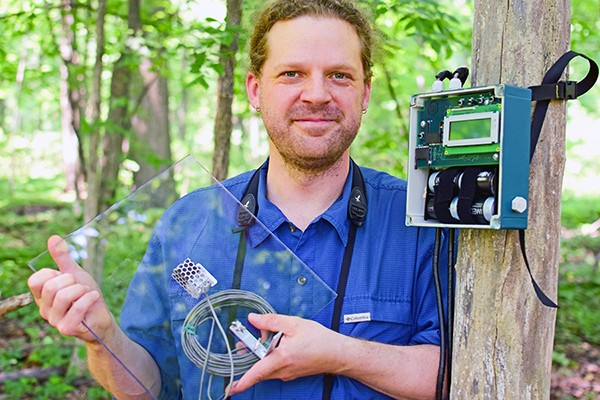 Biology professor Dan Mennill displays some of the sonic equipment used to track birds migrating at night.
Biology professor Dan Mennill displays some of the sonic equipment used to track birds migrating at night.
Ground-level light from backyard lights and streetlamps is causing a significant shift in the way nocturnal migratory birds fly though Southwestern Ontario, according to new UWindsor research. Biology professor Dan Mennill and undergraduate student Matt Watson (BSc 2014) found that 30 times more birds are flying over lighted areas than un-lit ones.
“This is most definitely a concern because the light is obviously changing how birds are flying and is causing them to spend excess energy on migration,” says Dr. Mennill. “It means they are arriving exhausted at their wintering and breeding grounds after flying in a circuitous path, or changing the altitude of their path. It is not good news for the birds, regardless of the explanation.”
The research was published as the article, Anthropogenic light is associated with increased vocal activity by nocturnally migrating birds, in the April 2016 edition of the Condor, the journal of the Cooper Ornithological Society. The newsmagazine Newsweek also covered the research results.
Mennill says it is well known that high-level light from skyscrapers and communications towers affect migratory patterns, but the influence of low-level and ground lighting has not been studied previously.
Since the researchers cannot see the nighttime flyers, they place microphones in the field and record the unique calls. The audio files are analyzed in the lab and used to identify the species.
“In addition to the significantly larger number of birds flying over lighted sites, we also found that around six to seven species were flying over the lighted sites, whereas only three to four were detected over dark sites,” Mennill says.
The researchers recorded the migratory birds’ unique nighttime calls as they flew over 32 sites in the Lake St. Clair and Lake Erie region during the fall 2013 migration season. The sites were paired up as sister sites, half shrouded in darkness and the others located nearby in well-lit areas.
“Now that we know the lights change their behaviour, we want to figure out exactly how the behavior is changing,” he says. “The birds may be flying closer to the ground when passing over lights so the recording equipment is able to more easily pick up the calls, or the light could also be confusing the birds because they navigate the night sky by the stars.”
“The results from this study suggest we can help birds by turning off our lights during migration season,” he says. “In September and October or April and May, we can turn off our backyard decorative lights and really make a difference.”
